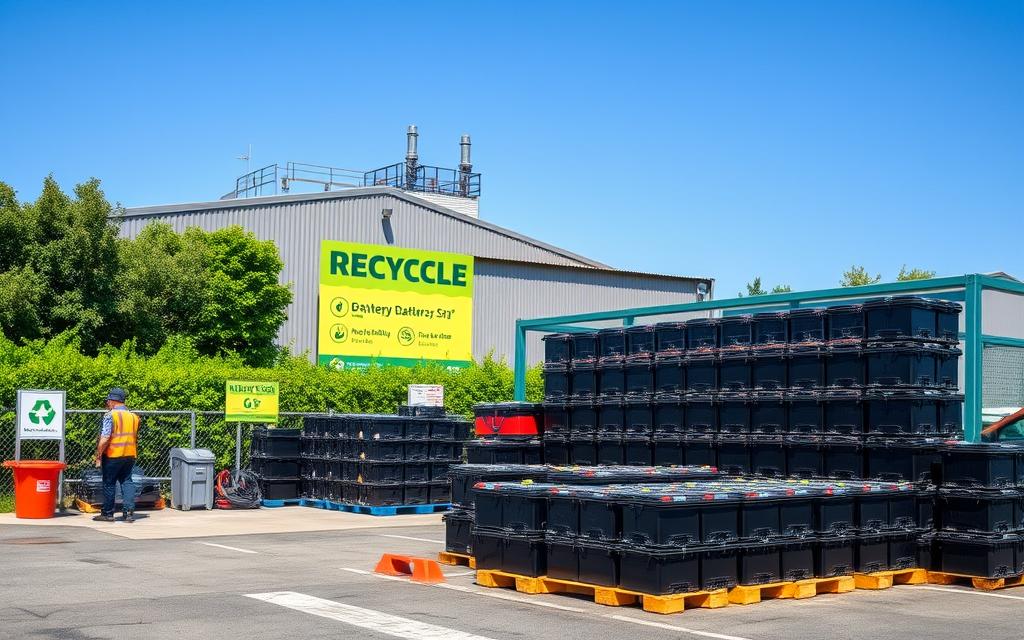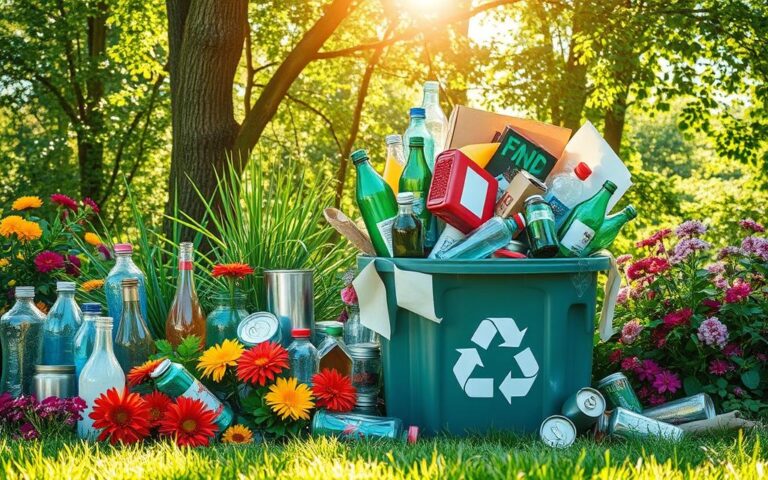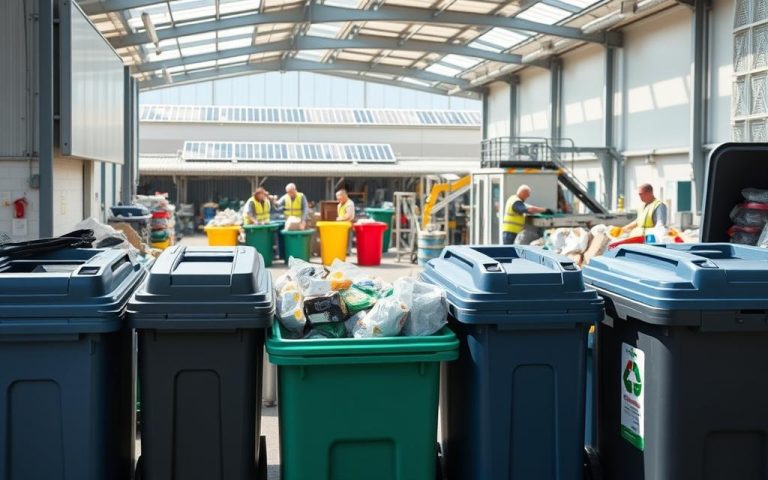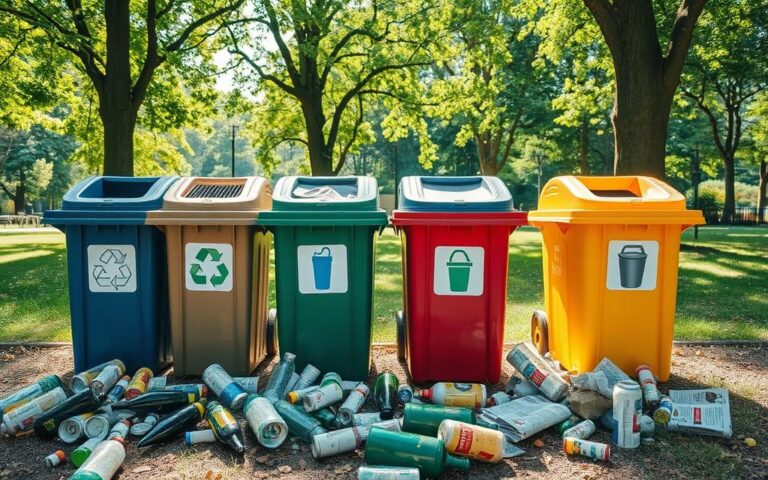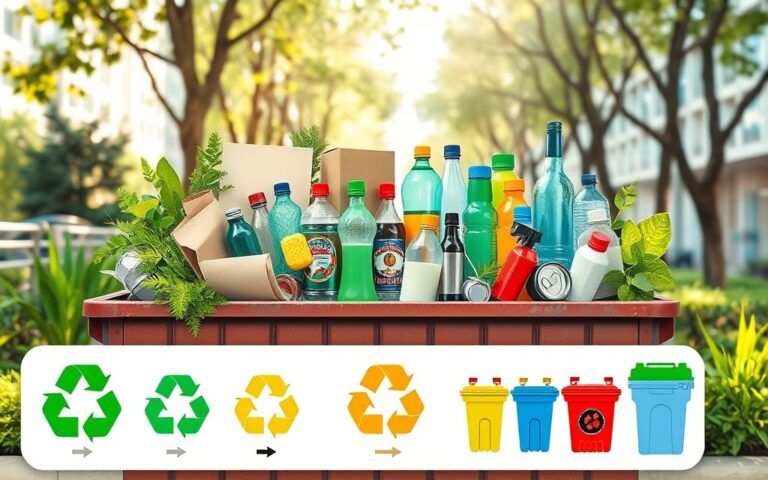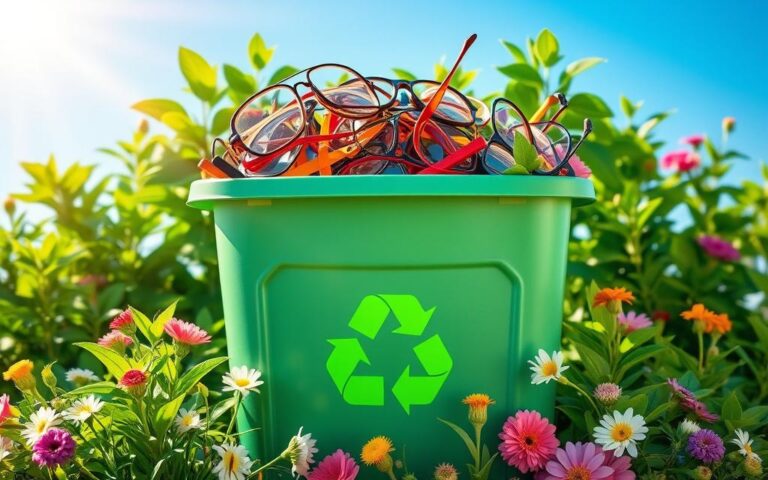Where Can I Recycle Car Batteries? Locations and Tips
Recycling car batteries helps protect our environment. It also supports sustainability. Knowing how to recycle car batteries safely is important for everyone.
The impact of batteries on the environment is big because they have dangerous materials. It is vital to dispose of car batteries the right way. If not done properly, the environment could suffer a lot.
There are many places where you can recycle car batteries. This makes it easier to do the right thing. Car batteries have a high recycling rate of 98 to 99 percent in the U.S. Recycling them is good for the planet and might even earn you some money. For more tips on recycling the right way, visit how to dispose of batteries responsibly.
Understanding Car Battery Recycling
Recycling car batteries is key to protecting our environment and saving money. It’s estimated that over 140 million electric vehicles will be on U.S. roads soon. Recycling them helps avoid the need for new materials. It ensures valuable elements are reused for new batteries.
Importance of Recycling Car Batteries
Recycling lead-acid batteries has a big impact. Roughly 80% of a new battery’s materials are from recycled sources. This reduces the need for new lead mining, which harms the environment. Recycling starts by taking away the battery acid. Then, materials are shredded to separate them. This process reclaims harmful materials like lead and sulphuric acid.
Environmental Impact of Improper Disposal
Wrongly disposing of car batteries can harm the planet. Lead and acid can leak, contaminating soil and water. It shows why recycling correctly is crucial for the environment. With a recycling rate of 99.3% for lead-acid batteries, it’s clear recycling is vital. It helps avoid the dangers of hazardous waste.
Locations for Car Battery Recycling
Finding the right places to recycle car batteries is key for environmental care and convenience. Many choices are available, such as auto part stores, local mechanics, and recycling centers. They play a crucial part in safe battery disposal and handling dangerous materials right.
Auto Parts Retailers
Auto parts shops are often handy for battery recycling locations. Stores like Advance Auto Parts run retailer recycling programmes. They let customers return old batteries for free, especially when buying a new one. This is good for the environment and gives financial perks, like refunds on deposits for battery exchanges. Stores make it simple to recycle properly, pushing for the right disposal methods.
Local Mechanics and Garages
Local mechanics and garages are more than repair spots; they’re key in garages recycling. These spots collect old batteries and send them to recycling centres. They work with recycling programmes, making sure everything follows the law. Using a local mechanic for battery recycling is smart. It helps the environment and the local economy too.
Recycling Centres
Recycling centres are crucial for getting rid of batteries safely. They deal with different waste, including car batteries. Finding nearby dedicated recycling facilities lets people make sure their batteries are dealt with right. This reduces environmental damage. Some places even have battery drop-off sites to make things easier, which is vital for recycling efforts.
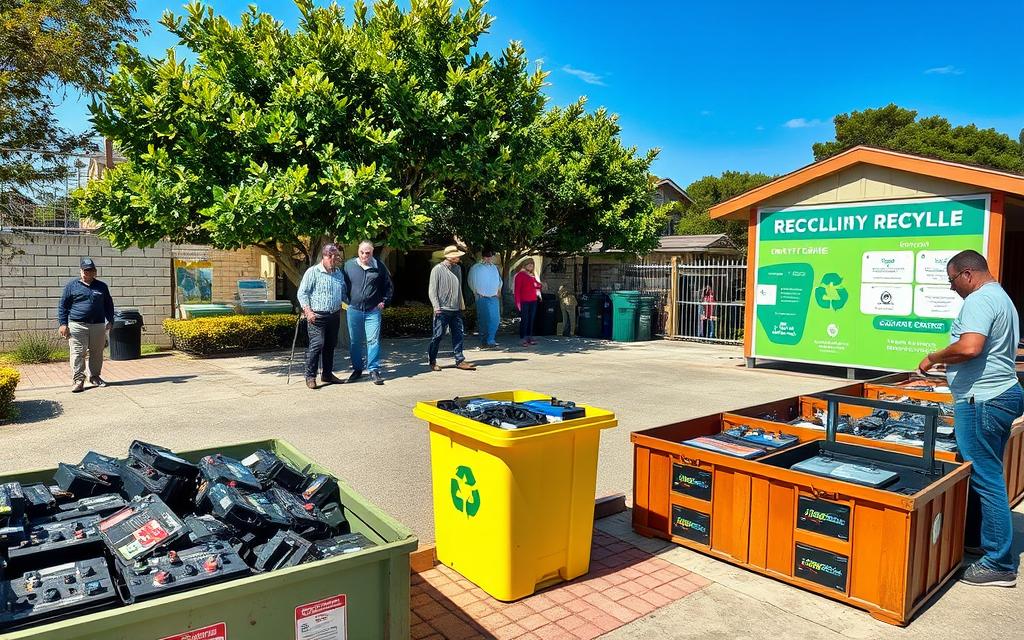
Places like Langley Recycling in Kansas City show how important these options are. They take various used batteries for recycling and sometimes pay customers for them. With the right recycling practices, communities can help make the planet cleaner.
Where Can I Recycle Car Batteries?
It’s now easy to recycle car batteries, with many services available. Auto parts retailers offer to take old batteries back at no extra cost. This approach helps the environment and keeps recycling responsible.
Return Options at Purchase Points
Many shops offer recycling when you buy from them. They want to make it easy for you to recycle right where you buy. Some even give cash back for bringing in your old battery. Companies like Interstate Batteries and Langley Recycling offer a mix of responsibility and rewards.
Community Recycling Events
Local groups lead by setting up recycling days for safe battery disposal. These events make it easy for everyone to participate. By joining in, people help the planet and learn the value of recycling together.
Tips for Safe Car Battery Disposal
It’s vital to dispose of car batteries carefully for safety and the planet. Knowing how to handle batteries correctly avoids dangers and helps recycle materials well. Make sure to follow these guides for proper battery disposal.
Handling Old Batteries Responsibly
Wear protective gear when dealing with old batteries. Gloves protect you from harmful acids and lead. Always keep batteries cool, dry, and in a place with good air to stop gas build-up. Here’s what you should do for safe disposal:
- Keep batteries upright to stop leaks.
- Don’t mix different types of batteries to avoid dangerous reactions.
- Swollen batteries are risky and need careful handling.
- Lead-acid batteries have lots of lead and strong acid, requiring cautious handling.
Packaging and Transportation Guidelines
Correct packaging is key for safe battery transport. Use strong, tight containers for moving batteries safely. Follow these steps for worry-free transportation:
- Car batteries must stay upright to prevent spills.
- Wrap lead-acid batteries in sturdy plastic bags to catch leaks.
- Use non-conductive bins for lithium-ion and nickel-metal-hydride batteries to stop short circuits.
- Know your local rules about hazardous materials to avoid fines.
Financial Benefits of Recycling Car Batteries
Recycling car batteries helps the environment and offers financial benefits. It supports sustainability and can give cash returns. This is because companies, like Interstate Batteries, reward you for recycling. This makes recycling a good choice for individuals.
Potential Cash Returns
Recycling car batteries can surprisingly give you money. The payment depends on the battery’s type and weight. Lead-acid, lithium-ion, and Absolyte batteries can all earn you cash. Many states also require recycling lead-acid and lithium-ion batteries.
If you recycle a lot at once, you could gain a lot. Estimates suggest that by 2040, recycling could bring in $8.1 to $9.3 billion overall. This shows how recycling is good for both the planet and your wallet.
Environmentally Conscious Choices
Choosing to recycle car batteries is key for the environment. It saves valuable resources and reduces landfill waste. Consumers are choosing companies that care about the environment more than ever.
In recycling, old batteries are broken down to make new ones. This cuts waste and manufacturing costs. Also, direct recycling methods can make the process more efficient and cheaper.
Investments that consider social and environmental impacts make recycling even more beneficial. As people become more eco-aware, sustainable practices offer rewards for both individuals and companies.
Understanding the Recycling Process
Car battery recycling involves steps specifically designed to reclaim valuable materials. It starts with collecting used batteries. This leads to different recycling methods that safely remove lead, plastic, and more. These steps show how efficient and important modern recycling is.
What Happens to Recycled Batteries
Recycled car batteries are taken apart to save materials. For example, separating alkaline and zinc-carbon batteries gives us zinc, manganese, steel, and paper. Lithium-ion batteries are also recycled, creating cobalt, lithium salts, steel, and copper.
Nickel-cadmium and nickel-metal hydride batteries go through high-heat processing. This separates the metals and plastics. Thanks to new tech, battery recycling now hits a 100% success rate. Plus, recycling lead-acid batteries, often found in cars, helps recover lead, sulphuric acid, and plastic. These can be made into new batteries.
The Role of Lead and Plastic in Recycled Batteries
Lead and plastic are crucial for the battery industry’s sustainability. Lead recycling means many new batteries are made with recycled lead. This reduces environmental harm. The resale value of lead-acid batteries also motivates recycling.
Plastic recycling repurposes battery plastic. This lowers the need for new plastics. Recycling is key to saving resources and encouraging eco-friendly practices.
| Battery Type | Recycling Method | Products Recovered |
|---|---|---|
| Alkaline/Zinc Carbon | Mechanical Separation | Zinc & Manganese Concentrate, Steel, Paper & Plastic |
| Lithium-Ion | Mechanical Process | Cobalt & Lithium Salt Concentrate, Stainless Steel, Copper, Aluminum, Plastic |
| Nickel-Cadmium | High-Temperature Metal Reclamation | Metals and Plastic |
| Lead-Acid | Various | Lead, Sulphuric Acid, Plastic |
| Lithium | Shredder or High-Speed Hammer | Ferrous & Non-Ferrous Metals, Carbon Cake, Lithium Carbonate |
| Mercury | Controlled-Temperature Processes | Various Components (Decreasing due to Regulations) |
Conclusion
Disposing of car batteries involves more than just the environment. It’s about keeping our community healthy and protecting our natural world. Recycling batteries is key in preventing harmful effects, like pollution in our soil and water. It’s impressive that nearly all parts of a car battery can be recycled. This lessens the need for new materials and the environmental harm from getting them.
You can find places to recycle batteries at local shops, with mechanics, or at recycling centres. Doing so helps save our planet and can even save you money. It shows how we can all play a part in looking after the environment. Through recycling, we support each other in making a sustainable future.
Finally, let’s get involved in recycling and make a positive change. Recycling car batteries protects our surroundings and keeps us healthy. Every action you take matters. Let’s commit to a greener world for the next generation. Together, we can make sure our planet stays beautiful and vibrant for years to come.
FAQ
Where can I recycle my car battery?
Try auto parts shops like Halfords or Advance Auto Parts. Your local mechanic, garage, or a recycling centre nearby also accept them.
Why is it important to recycle car batteries?
It’s key to recycle to avoid new lead mining and save resources. It keeps hazardous stuff from harming the earth. Plus, most of a battery can be used again in new ones.
What are the environmental impacts of improper battery disposal?
Throwing batteries away wrongly can cause toxic lead and acid to pollute soil and water. This is bad for ecosystems and health. It shows why recycling right matters a lot.
Can I return my old car battery when I buy a new one?
Indeed, many shops where you buy batteries will take the old one without extra charge. Sometimes, they might even give you a deposit refund.
What should I do if I have an old battery to dispose of?
Be safe by wearing gloves and keeping the battery upright to prevent leaks. Always use a sturdy, leak-proof container when you take it to be recycled.
Are there financial benefits to recycling car batteries?
Yes, you could get cash for recycling them, especially in bulk. Prices for scrap lead change, so shop around for the best deals.
What happens to batteries once they are recycled?
Recycling gets back useful materials like lead and plastic. These are then made into new batteries. It helps save resources and supports sustainable recycling.
How can I find community recycling events?
Check with your local council or community groups. Local news and official websites might also have info on recycling events around you.

